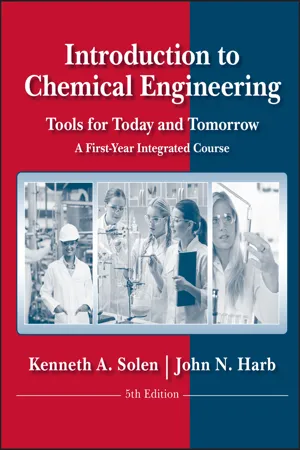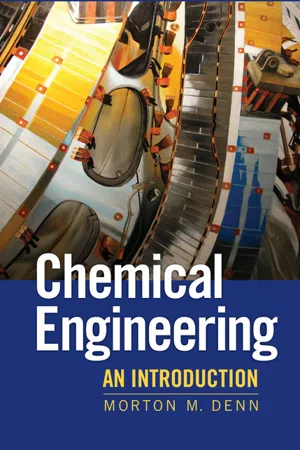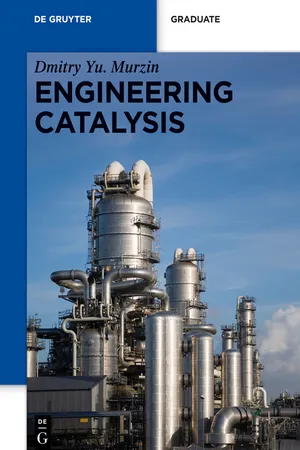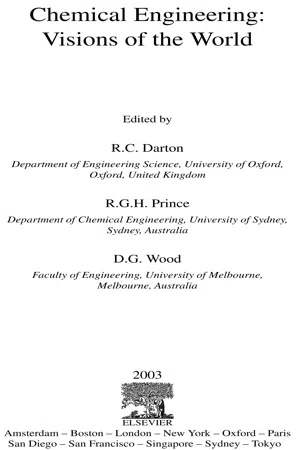Technology & Engineering
Chemical Engineering
Chemical engineering involves applying principles of chemistry, physics, and mathematics to design and operate processes that convert raw materials into valuable products. This field plays a crucial role in various industries, including pharmaceuticals, food and beverage, energy, and environmental sustainability. Chemical engineers work on developing efficient and sustainable processes, optimizing production, and ensuring safety and environmental compliance.
Written by Perlego with AI-assistance
Related key terms
1 of 5
9 Key excerpts on "Chemical Engineering"
- eBook - ePub
- DeLean Tolbert Smith, Aishwary Pawar, Nicole P. Pitterson, Debra-Ann C. Butler(Authors)
- 2022(Publication Date)
- Visible Ink Press(Publisher)
Chemical Engineering
What is Chemical Engineering?Chemical Engineering is a branch of engineering that deals with chemicals, chemical production, and manufacturing materials and products that require chemical processes. This involves developing tools, methods, and techniques for refining raw materials as well as combining, compounding, and processing chemicals in order to create useful products. It applies chemistry, physics, mathematics, biology, and economics concepts to the efficient production, development, transportation, and transformation of energy and materials.What do chemical engineers do?Chemical engineers understand many different chemical processes that occur in a laboratory. They use that knowledge to develop practical applications for how products are developed. Once the process is developed, they are also responsible for maintaining those processes. Chemical engineers design products and processes, develop plans for facility layouts, create new tools to improve products and processes, manage processes and facilities, and do research that inspires new innovations. They have many areas of expertise that cover a broad variety of areas.DID YOU KNOW?Do chemical engineers still perform experiments?Yes, chemical engineers must still understand the basic principles of chemistry. Before they design a large Chemical Engineering plant or process, they will perform a lab experiment of the chemical process. Then, when they understand the process on a micro level, they will better understand how to select the approach innovations, designs, and technologies needed for full-scale production. This helps them identify potential challenges to the process on a small scale and will allow them to make design considerations for those challenges when they scale up.What are the different branches of Chemical Engineering?Chemical Engineering is a field that is constantly evolving. People who graduate with Chemical Engineering degrees may find that long after graduation, they are working in professional roles that may not have existed when they graduated. Chemical engineers are engaging in lifelong learning as they learn and practice new applications for Chemical Engineering theory. Here are some branches of Chemical Engineering that an engineer might work in: - eBook - PDF
- Roderick A. Macleod, Jim Corlett, Roderick A. Macleod, Jim Corlett(Authors)
- 2012(Publication Date)
- De Gruyter Saur(Publisher)
The special feature of Chemical Engineering is that its practitioners design processes rather than equipment, so the term 'process engineering' is sometimes used. Likewise, Chemical Engineering skills are applied in many areas apart from chemicals, such as food, biotechnology, materials, or water treatment. These are the so-called process industries. Chemical Engineering Martin Pitt -4330 Chemical Engineering In general, a process involves the transfer and conversion of matter and energy. Chemical reactions are often not involved at all. Chemistry and thus the chemical literature therefore only play a minor part. The task of a chemical engineer is principally to analyse and optimize the mass and energy flows, then consider different portions, the so-called 'unit opera-tions' and specify (rather than design) the equipment required. Actual equipment may be bought off the shelf or designed by specialists. The chemical engineer therefore draws upon fundamental science and engineering which is common to other disciplines. Unfortunately books on these topics specifically intended for chemical engineers are quite likely to end up elsewhere in bookshops and libraries. Thus information on heat transfer may be shelved by the library in the section for mechanical engi-neering, fluid flow texts may be split between civil and mechanical engineering, whereas thermodynamic data may be in chemistry or physics! However, chemical engineers commonly have to deal with chemists and other engineers in order to get their processes built, so they may be expected to have some familiarity with the other disciplines, and at least know where to look things up. In practice, much useful information relating to processes tends to be defined by the end use. So far as the chemical engineer is concerned, pumping chocolate or pumping concrete is much the same, but relevant data and know-how will be found in quite different sources. - eBook - PDF
Introduction to Chemical Engineering
Tools for Today and Tomorrow
- Kenneth A. Solen, John N. Harb(Authors)
- 2011(Publication Date)
- Wiley(Publisher)
But this hypothetical problem is a useful prototype, because it will require us to perform some relevant Chemical Engineering cal- culations, design some equipment, and justify our proposal to the “company” through an economic analysis, all of which are typical tasks and approaches for a chemical engineer, regardless of the specific application. By the time we reach the end of this book, you will have a better idea of the kinds of activities in which chemical engineers are engaged and the skills that are required for those activities, as well as how those activities and skills match up with your interests and abilities. Now, let’s address the question posed by the title of the chapter. 1.2 WHAT IS Chemical Engineering? Chemical Engineering creatively combines the three basic physical sciences – chem- istry, physics, and biology – along with mathematics to address the world’s needs by cre- ating new technology and solving problems in existing technology. The use of all three basic sciences and mathematics makes Chemical Engineering extremely versatile, since nearly all physical phenomena can be described by the combination of these four sciences. Because of this versatility, chemical engineers make valuable contributions in a very broad spectrum of fields from food processing to semiconductor fabrication and from energy pro- duction to artificial-organ development (see Fig.1.1). The American Institute of Chemical Engineers (AIChE) has suggested the following definition 1 : [Chemical engineers] use science and mathematics, especially chemistry, biochemistry, applied mathematics and engineering principles, to take laboratory or conceptual ideas and turn them into value added products in a cost effective, safe (including environmental) and cutting edge process. - eBook - PDF
Chemical Engineering
An Introduction
- Morton Denn(Author)
- 2011(Publication Date)
- Cambridge University Press(Publisher)
1 Chemical Engineering 1.1 Introduction Chemical Engineering is the field of applied science that employs physical, chemical, and biochemical rate processes for the betterment of humanity. This is a sweeping statement, and it contains two essential concepts: rate processes and betterment of humanity . The second is straightforward and is at the heart of all engineering. The engineer designs processes and tangible objects that meet the real or perceived needs of the populace. Some civil engineers design bridges. Some mechanical engineers design engines. Some electrical engineers design power systems. The popular per-ception of the chemical engineer is someone who designs and operates processes for the production of chemicals and petrochemicals. This is an historically accurate (if incomplete) image, but it describes only a small fraction of the chemical engineers of the early twenty-first century. Chemical Engineering is the field of applied science that employs physical, chemical, and biochemical rate processes for the better-ment of humanity. Let us turn first to the concept of rate processes , which is the defining paradigm of Chemical Engineering, and consider an example. Everyone is familiar with the notion that medication taken orally must pass through the digestive system and across membranes into the bloodstream, after which it must be transported to the relevant location in the body (a tumor, a bacterial infection, etc.) where it binds to a receptor or reacts chemically. The residual medication is transported to an organ, where it is metabolized, and the metabolic products are transported across still more membranes and excreted from the body, perhaps in the urine. Each of these processes takes time, and the rate of each step plays an important role in determining the efficacy of the medication. - eBook - ePub
Schumpeter and the Endogeneity of Technology
Some American Perspectives
- Nathan Rosenberg(Author)
- 2000(Publication Date)
- Routledge(Publisher)
This should not be controversial. A steam engine or a dynamo are not technologies; they are tangible capital equipment. “Steam” or “electricity,” meaning bodies of knowledge about how to produce steam or electricity and to use them as sources of power or light in steam engines or dynamos, are technologies. Similarly, Chemical Engineering is a body of knowledge about the design of certain technologies: specifically, Chemical Engineering is a body of knowledge about the design of process plants to produce chemical or other products whose production involves chemical transformations. Since Chemical Engineering provides essential guidance to the design of a very wide range of plants, it may usefully be thought of as a GPT. Furthermore, there has been both a vertical and a horizontal dimension to the externalities that were generated. The emergence of Chemical Engineering meant that downstream sectors experienced lower invention costs. But, in addition, there was a powerful horizontal externality, in the sense that the vast market for petroleum shaped the development of petrochemicals through the intermediation of Chemical Engineering.The Relationship of Chemical Engineering to the Science of ChemistryThe first step in this exploration must, necessarily, be a deck-clearing operation. In order to understand the role played by Chemical Engineering in the process of technological change, it is necessary to deal with a widely held view that Chemical Engineering, like other engineering professions, is simply applied science – in this case applied chemistry. It is suggested that Chemical Engineering can most usefully be thought of as a body of technological knowledge that is not reducible to applied science, nor did it have its historical origins in science, although at a later stage in its development it began to draw upon certain realms of science and, in that sense, subsequently became more scientific. Chemical Engineering is, rather, a body of useful knowledge concerning certain manufacturing processes that could not be derived by deduction or by simple extension from the established sciences.Although the science of chemistry indeed became a major source of new chemical products, beginning with Perkin’s immensely important opening up of the field of organic chemistry in the second half of the nineteenth century, that scientific breakthrough provided very little guidance to the process technologies that would be essential to the manufacture of chemical products in the twentieth century. Chemical Engineering emerged early in the twentieth century as a separate body of knowledge that could guide the design as well as the operation of chemical process plants, including plants producing old established products, such as ammonia, in addition to new ones. But the rapid expansion of Chemical Engineering in the twentieth century was due not so much to the late nineteenth-century growth of the synthetic dye industries as to other industries that were far more dependent on Chemical Engineering capabilities. - eBook - PDF
- Dmitry Murzin(Author)
- 2013(Publication Date)
- De Gruyter(Publisher)
4 Engineering technology 4.1 General structures of chemical processes This chapter will discuss the practical implementation of heterogeneous catalytic processes. The general structure of chemical processes are presented in Fig. 4.1. Physical treatment Raw materials Reactor Physical treatment Products Fig. 4.1: General structure of chemical processes. As can be seen in Fig. 4.1 the main features of the chemical processes could be identified as: feed purification, reaction, separation and product purification. Chemical technology is the science of those operations, which convert raw materials into desired products on an industrial scale, applying one or more chemical conver-sions. A new technology can succeed only if it is robust, reliable, safe, clean, cheap, easy to control, and if it provides significant gains over existing processes. Moreover, technology should be based on sound economical considerations, safety requirements and labor conditions. It is important to note that in chemical technology the process should be viewed in its whole complexity, rather than a combination of individual steps. For example, the performance of a reactor unit can depend on the performance not only of the units located upstream to reactor vessel, but also downstream. Obviously the upstream units would influence the inlet composition or the purity of the feedstock, and thus have an impact on the reactor. Selectivity changes made by adjusting the catalyst performance would influence separation. A loss of pressure downstream from the reactor could lead to an increase of pressure in the reactor and might damage the catalyst support grid. Improvement of one unit (reactor) usually improves the overall performance. Thus, a slight improvement in catalyst selectivity would sometimes result in very high savings in separation. It should be also mentioned that optimum conditions for a system element are not necessarily optimum for the system as a whole. - eBook - PDF
- Bonnie A. Osif(Author)
- 2016(Publication Date)
- CRC Press(Publisher)
enrollments.rise.and.fall.with.changes.in.national.economies . .Chemical.engineering.departments. are.fairly.quick.to.recognize.and.incorporate.new.curricula,.which.explains.the.current.emphasis.on. biology.and.nano-based.engineering.programs.(Halford,.2004) . A. layman’s. explanation. of. what. chemical. engineers. do. includes,. “construct. synthetic. fibers. that.make.our.clothes.more.comfortable.and.water.resistant;.….develop.methods.to.mass.produce. drugs,.making.them.more.affordable;.….create.safer,.more.efficient.methods.of.refining.petroleum. products,.making.energy.and.chemical.sources.more.productive.and.cost.effective”.(AIChE) . A DDITIONAL R EADING These.resources.will.provide.a.better.understanding.of.the.nature.of.chemical.engineering.both. from.a.historical.perspective.and.its.current.practice . AccessScience . . McGraw-Hill. http://www .accessscience.com/ . (subscription. required). (see. Chapter.2,.this.volume) . .McGraw-Hill’s. Access Science .is.the.continuously.updated.online. version. of. both. McGraw-Hill Encyclopedia of Science and Technology . and. McGraw-Hill Dictionary of Scientific and Technical Terms . .Included,.for.example,.are.chapters.on. chemical.engineering,.biomedical.chemical.engineering,.biochemical.engineering,.and.the. chemical.process.industry . Felder,.R . .Resources.in.Science.and.Engineering.Education.http://www4 .ncsu.edu/unity/lock-ers/users/f/felder/public/RMF.html .(accessed.March.29,.2011) . . A. comprehensive. discus-sion.of.effective.instructional.techniques.that.have.been.validated.for.both.individuals.and. groups. History. of. Chemical. Engineering. Web. Page. http://www .pafko.com/history/h_intro.html . (accessed.November.9,.2010) . .A.light-hearted,.albeit.serious,.look.at.the.growth.of.chemi-cal.engineering.as.a.profession,.using.the.petroleum.industry.as.a.case.study . LIBRARY CATALOGS Given.recent.trends.toward.adding.book.chapter.titles.in.library.catalog.records,.and.the. - eBook - PDF
- R. C. Darton, D. G. Wood, R. G. H. Prince(Authors)
- 2003(Publication Date)
- Elsevier Science(Publisher)
By the late 1940s, Chemical Engineering had become estab-lished as a profession and key to the future success of the rapidly growing chemical industry, and both industrial and public investment was forthcoming to try to ensure an adequate supply of future practitioners. During the first half of the twentieth century, the academic discipline of Chemical Engineering had been concerned with the development of a body of knowledge based on the concept of unit operations. However, by the late 1940s, it became clear that the scientific principles underlying the analysis of unit operations could be useful objects of study in their own right, and the Chemical Engineering Science (CES) movement emerged to define a new ‘era’ [32] or ‘second paradigm’ [33] of the discipline. In a sense, CES was not a paradigm shift, but a natural development of the concerns of the early pioneers at MIT. Their goal had been to develop and illustrate ‘those principles of science upon which Chemical Engineering operations are based’ [34]; the Chemical Engineering science movement sought to develop and organise those principles, but in a more general context than unit operations. Key to these developments was the realisation that a more substantial knowledge of the fundamentals of momentum, heat and mass transfer might enable chemical engi-neers to formulate and solve a wider variety of problems in new areas of activity [32]: ‘For 40 years it had been recognised that a scientific approach to the basic principles of the transfer of heat, mass, and momentum applicable to Chemical Engineering was lack-ing in scientific and mathematical development. ... With the unlimited number of systems involving thousands of molecular species in chemical processing, it became logical that a theoretical approach be undertaken based upon molecular concepts and transport proper-ties. - eBook - PDF
Engineering Fundamentals
An Introduction to Engineering, SI Edition
- Saeed Moaveni(Author)
- 2019(Publication Date)
- Cengage Learning EMEA(Publisher)
Materials engineering may be further divided into metallurgical, ceramics, plastics, and other specialties. You can find materials engineers working in air- craft manufacturing; various research and testing labs; and electrical, stone, and glass product manufacturers. Because of the low number of current graduates, the job opportunities are good for materials engineers. Engineering Technology In the preceding text, we introduced you to the engineering profession and its various areas of specialization. Let us now say a few words about engineering technology. For those of you who tend to be more hands-on and less interested in theory and mathematics, engineering technology might be the right choice for you. Engineering technology programs typically require the knowledge of basic mathematics up to integral and differential calculus level, and focus more on the application of technologies and processes. Although to a lesser degree than engineers, engineering technologists use the same principles of science, engi- neering, and mathematics to assist engineers in solving problems in manufac- turing, construction, product development, inspection, maintenance, sales, and research. They may also assist engineers or scientists in setting up experiments, Copyright 2020 Cengage Learning. All Rights Reserved. May not be copied, scanned, or duplicated, in whole or in part. Due to electronic rights, some third party content may be suppressed from the eBook and/or eChapter(s). Editorial review has deemed that any suppressed content does not materially affect the overall learning experience. Cengage Learning reserves the right to remove additional content at any time if subsequent rights restrictions require it. CHAPTER 1 Introduction to the Engineering Profession 32 conducting tests, collecting data, and calculating some results.
Index pages curate the most relevant extracts from our library of academic textbooks. They’ve been created using an in-house natural language model (NLM), each adding context and meaning to key research topics.








